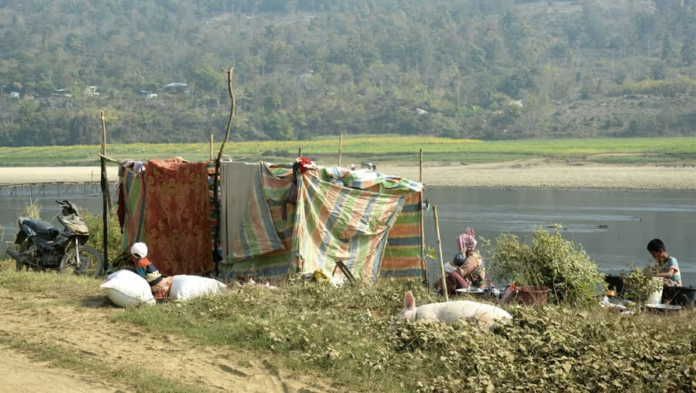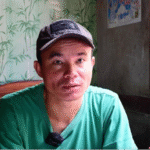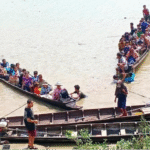An interview with an official from Kale IDP Assistance Group regarding the living difficulties, food needs, and health conditions faced by displaced people from southern Kale Township
The military junta carried out relentless airstrikes targeting southern Kale Township in Sagaing Region from 31 January to 19 February, resulting in the deaths of nearly 20 civilians and abruptly displacing more than 10,000 residents from at least 15 villages in the area.
Even now, the junta continues near-daily airstrikes, preventing displaced residents from returning to their homes. As a result, they are hiding in the mountains, getting by in any possible way they can.
Due to the consumption of unclean water in the areas where they have taken shelter, hundreds of displaced people are grappling with health issues such as diarrhea, skin diseases, and other ailments. To shed light on the current living struggles, food needs and health conditions of those displaced from southern Kale Township, Khonumthung Media Group (KMG) interviewed an official from the Kale IDP Assistance Group, which has been providing on-the-ground support to the affected population.
Q: How many villages in southern Kale Township have had to flee due to the junta airstrikes ,and clashes? And how many people are affected?
A: Due to the junta airstrikes, people from as many as 15 villages have had to flee to safety. We estimate that over 10,000 people are currently displaced.
Q Where are most of the displaced people taking shelter, and what kind of conditions are they living in?
A: It’s hard to pinpoint exactly where the displaced people from southern Kale are staying. This is because the military council’s atrocities are affecting innocent civilians, so we can’t disclose precise locations. They’re scattered all over. The displaced are living in places they consider safe from the bombings—anywhere they can take shelter and survive.
Q: How many women and young children are among the displaced population?
A: I’d say the majority. Our team has been consistently providing supplies to the displaced, and from what we’ve seen, a large number of them are women and young children.
Q: What is the current situation regarding the displaced people returning to their homes?
A: At the moment, out of the many villages where people have fled due to the conflict—around 20 or so—only about five have been able to return. The remaining 15 or so still can’t go back. Because, even as recently as yesterday (19 February), the military council carried out an airstrike on Doe Nwe village. Incidents like this keep happening. They’re targeting areas with innocent civilians even when there’s no fighting. People are extremely worried and terrified about returning to their villages. Even if they’re not in the villages, they’re staying in places they think are safe, but they no longer feel secure wherever they are. The displaced people are constantly anxious and startled whenever they hear the sound of planes. Because of this, returning to their villages is going to take quite a bit of time.
Q: How are the displaced people managing their daily food needs?
A: As a group, our first priority is to provide immediate food supplies to the IDP camps that have been hit by airstrikes. We also help with personal hygiene items like soap, toilet bowls, and supplies like tarps for makeshift shelters.
Q: I’ve heard that diarrhea is breaking out among the displaced. How widespread is this issue?
A: Diarrhea is quite common among them. The reason is that when we visit the IDP camps to provide support, we’ve personally seen the water they’re using for drinking and personal needs. They bathe in these small streams, but upstream, animals like buffalo, cows, and other livestock drink from the same water. That’s where they’re living. Since the displaced can’t stay in one organized group, it spreads step by step—they bathe in the same water downstream after others have used it up above. The water isn’t clean, and it’s also extremely scarce. They have no choice but to drink and bathe in it. That’s how it is. Another issue is the lack of clean water, which is causing skin problems too. On top of diarrhea, many are suffering from skin conditions—ringworm, scabies , itching—both children and adults. A lot of the displaced are dealing with skin issues.
Q: What’s being done about medical treatment? What’s the situation with medicine and assistance?
A: Our team works to secure medicines by collaborating with revolutionary supporters overseas who donate funds, as well as with local battalions, units, and medical teams on the ground. We do provide medical care—there are clinics in the Kale area where comrades and civilians get free treatment from medical units. These teams go directly to the displaced in the field to provide care. But, because the number of IDPs is so overwhelming, we’re facing shortages of medicine. Medicines are especially critical. We’re managing some treatment right now, but it’s not enough. Getting medicines is extremely difficult at the moment, and our budget for purchasing them is very limited. For skin conditions, some of our partnered medical teams used to visit twice a week. But now it’s down to once every two weeks because of medicine shortages. Instead of four visits a month, they can only manage two. That’s the situation—it’s mainly a lack of medicine.
Q: Have there been any deaths due to these illnesses?
A: So far, we haven’t received any reports of deaths from these conditions.
Q: What are the main needs for the displaced people right now?
A: In the current situation, the immediate needs for the displaced are, first, essentials for daily living—salt, oil, things like that. Shelter is absolutely critical. Access to medicine is especially urgent. Clean water is desperately needed. And for lighting, things like solar panels or batteries are essential.
Q: Is there anything else you’d like to add?
A: On 31 January, the junta began bombing an IDP camp in southern Kale. From there, they’ve also attacked other villages with innocent civilians, hospitals, clinics—everything. A large number of people have been forced to flee. For the people in the Kale area, emergency food supplies, access to medicine, and clean water are urgently needed. I’d like to make a heartfelt appeal to the Myanmar people overseas, our ethnic brothers and sisters, to provide humanitarian aid to the displaced in Kale Township. They’re in dire need of support.
Sent by KMG.



